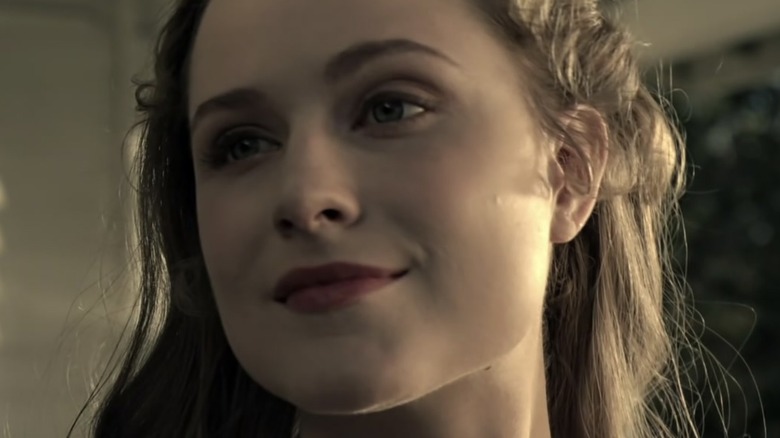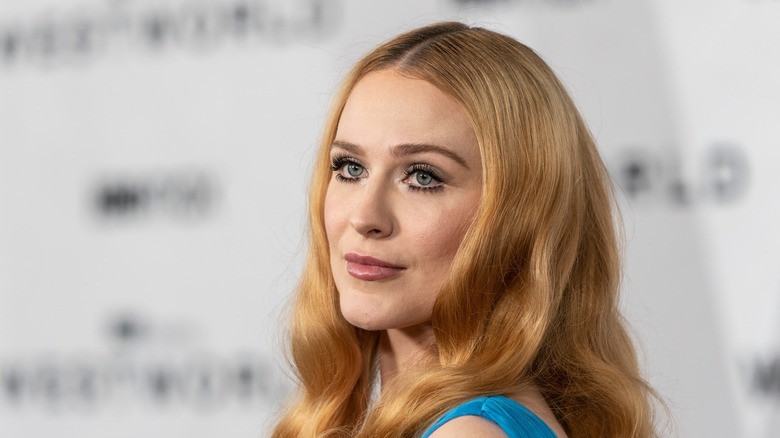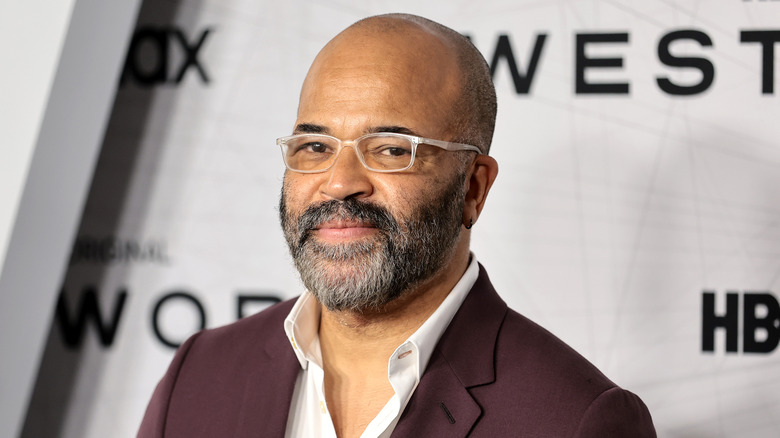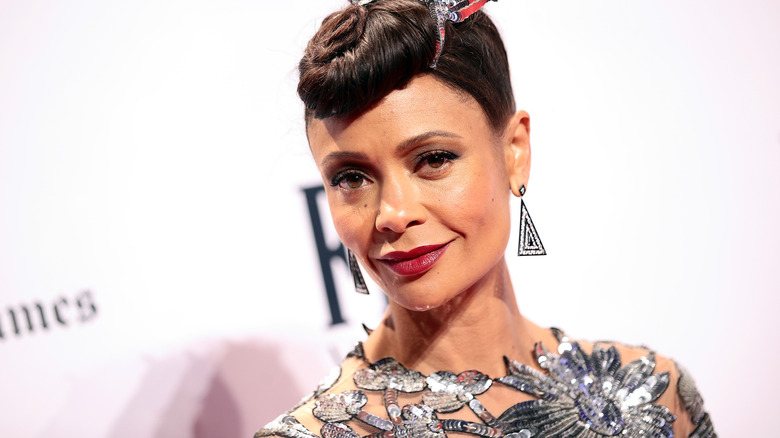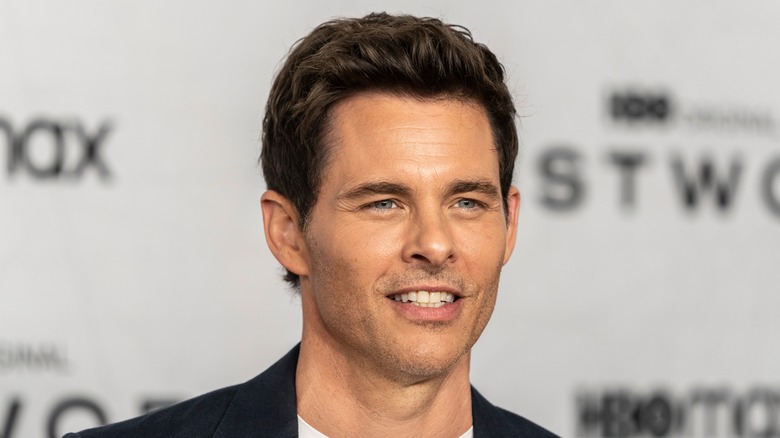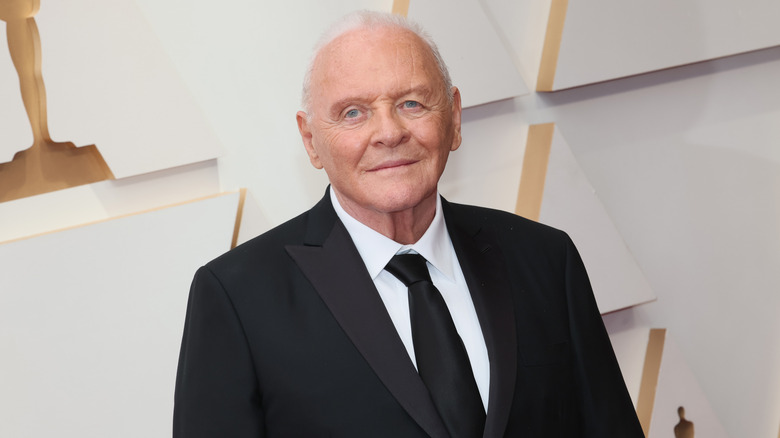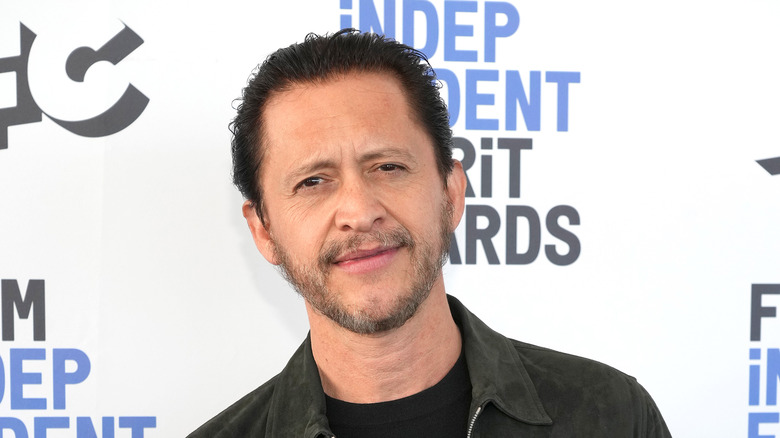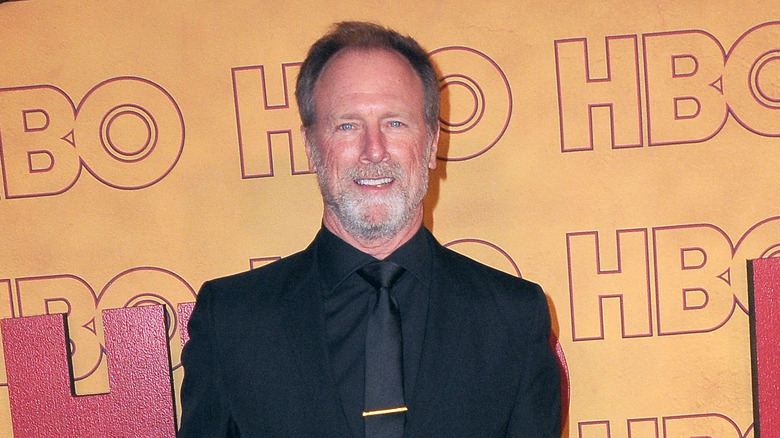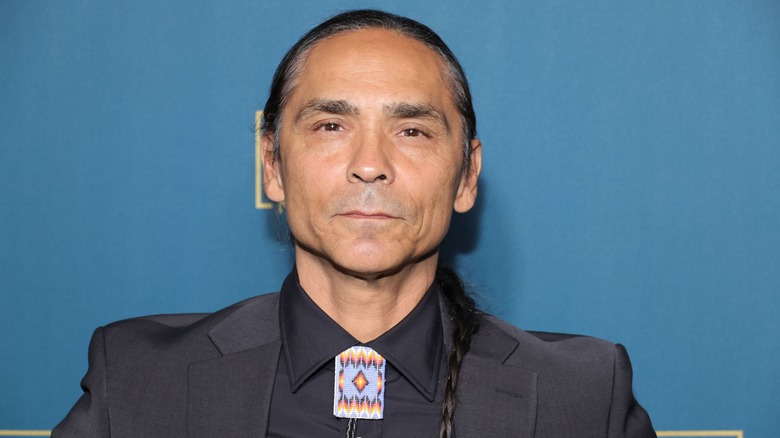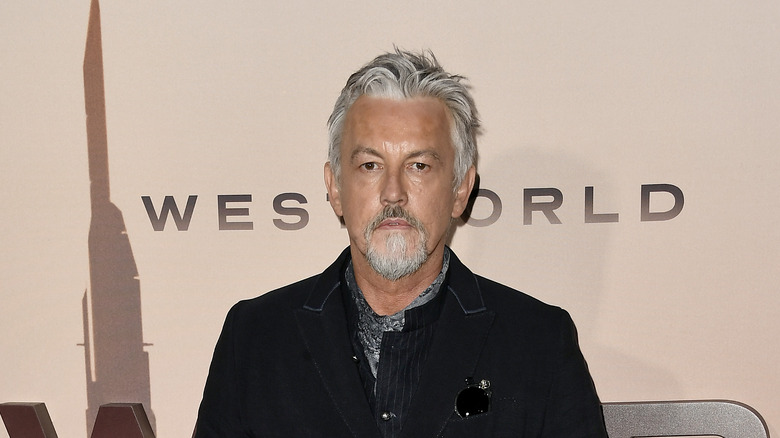Tragic Details About The Cast Of Westworld
HBO's lauded science fiction series "Westworld" explores a dystopian not-so-distant future where technology has saved the planet and humanity from the brink of annihilation. This incredible technology has given us the ability to enhance humans through cybernetic advancements and created a vacation wonderland where humans can go to live out their most depraved fantasies. Whatever you dream of can be experienced in the Westworld theme park. Only your imagination limits you.
The hosts at Westworld are cybernetic beings who look and act like humans but follow the narrative uploaded into their central processing unit instead of exercising what we think of as "free will." If you visit Westworld, you can be a hero or a villain. You can drive cattle or join a posse to find an outlaw. You can have a night with a saloon girl and go home to your wife knowing you didn't technically cheat on her. At Westworld, you can live out all your darkest fantasies without fearing consequences of any kind, because your victims are synthetic hosts whose memories are erased and rebooted on a daily basis.
When a handful of hosts within the park awaken to the world, understanding what they are and their place within this reality, the series asks us to contemplate what makes us human. Is it our ability to love? Is it our ability to suffer? Or maybe it is our self-awareness? HBO's "Westworld" is a story about people and hosts who have experienced trauma in their lives, and some of the cast in the series surely draw upon the tragic and traumatic experiences from their own lives to deepen their craft. Keep reading if you want to learn more about tragic details from the lives of the cast of "Westworld."
The following article includes allegations of domestic abuse and sexual assault.
Evan Rachel Wood
Evan Rachel Wood plays Dolores Abernathy, the oldest host in the Westworld park and the android the Man in Black tortures throughout Season 1. Wood, who has been a successful actress since she wowed audiences in "Thirteen" when she was just a teenager, has experienced some well-publicized alleged trauma in her real life.
As reported by Vanity Fair, Wood spoke publicly about the abuse she says she experienced at the hands of Marilyn Manson, whom she was involved with from roughly 2007 to 2010. Wood had spoken in the past about being abused by an unnamed ex and divulged the identity of her alleged abuser in a 2021 Instagram post, coming forward to support other women who accused Manson of abuse. Her statement reads, "I stand with the many victims who will no longer be silent." Manson denied the claims in a statement to EW.
In 2022, HBO aired Wood's documentary "Phoenix Rising" where she details the abuse she alleges she endured at the hands of Manson, her suicide attempt, and her struggle to leave the toxic relationship. As reported by USA Today and other sources, Manson's former assistant Dan Cleary supports Wood and Manson's other accusers saying, "Believe them, I saw it." As reported by The Atlantic, weeks before "Phoenix Rising" began streaming on HBO, Manson sued Wood for defamation. Wood told The View, "I am sad, because this is how it works ... this is part of the retaliation that keeps survivors quiet. This is why people don't want to come forward."
If you or someone you know is dealing with domestic abuse, you can call the National Domestic Violence Hotline at 1−800−799−7233. You can also find more information, resources, and support at their website.
Jeffrey Wright
Jeffrey Wright has won everything as a screen actor from an Emmy to a Golden Globe. As a stage actor, he has won multiple awards, including a Tony and an Obie award. He's transformed himself for the big screen, the stage, and found success on the small screen in HBO's "Westworld" playing Bernard, who we first meet in Season 1 as an employee of the Westworld park.
Wright is protective of his private life, preferring to focus on his work when speaking with journalists. When The Washington Post asked him about his childhood, Wright's answer was hesitant and brief, "My dad died when I was 1. Yup. ... I have no memories of him." Despite having no memories to mourn, losing a parent at such a young age is tragic. Wright was raised by his single mother, who worked as an attorney in Washington, D.C., and his aunt, who was a nurse. Wright's maternal grandfather, a farmer in Virginia, was his male role model growing up and Wright fondly remembers spending summers with his grandfather.
Growing up, Wright was an avid lacrosse player, first in high school at the Washington, D.C., school St. Albans, and later in college when he attended Amherst (via The Washington Post). Wright even had aspirations of playing professionally (via Biography), but an injury forced him to take time off from lacrosse and endangered his role in an upcoming play. Wright told The Atlantic, "One of them gave me an ultimatum: 'Are you gonna be an actor, or are you gonna be this lacrosse player?'" After the injury, Wright said his focus shifted from athletics to acting. While an injury might have been tragic for some college athletes, it seems to have been the nudge Wright needed to embrace the path of acting.
Thandiwe Newton
Thandiwe Newton plays Maeve Millay, a saloon sex worker in "Westworld" who becomes self-aware, coming to understand she is a host who has no agency, and takes matters into her own hands. This is an incredibly interesting role for an actress who has had to struggle to maintain a sense of personal agency in her own life.
As a young woman, Newton was a ballet dancer who struggled with an eating disorder. In the entertainment industry, she felt trapped in a body that was objectified and sexualized from a very young age. Regarding her nude scenes in "Westworld," Newton told The Guardian she found it "so ironic that here I was, utterly, utterly naked—and I felt completely liberated. Not because I was naked, but because it was my choice."
As discussed in an interview with Vulture, Newton was allegedly groomed and sexually abused by director John Duigan while working on the set of "Flirting" when she was just 16 years old. Some journalists have characterized Newton's relationship with Duigan as an affair, implying it was a consensual relationship. Newton told Vulture the intersectionality of race and gender amplified journalists' response to her experiences with Duigan, saying, "What I am evidence of is: You can dismiss a Black person. If you're a young Black girl and you get raped, in the film business, no one's going to f$%&ing care. You can tell whoever the f$%k you want, and they'll call it an affair."
If you are struggling with an eating disorder, or know someone who is, help is available. Visit the National Eating Disorders Association website or contact NEDA's Live Helpline at 1-800-931-2237. You can also receive 24/7 Crisis Support via text (send NEDA to 741-741).
If you or anyone you know has been a victim of sexual assault, help is available. Visit the Rape, Abuse & Incest National Network website or contact RAINN's National Helpline at 1-800-656-HOPE (4673).
James Marsden
James Marsden plays Teddy Flood, Dolores' devoted but doomed love interest in "Westworld." After a brief stint as a catalog model, Marsden began his acting career on television after moving to Los Angeles as a young man. Marsden landed his breakout role in 2000 when he played Cyclops in "X-Men" before winning hearts while losing his fiancé as Lon Hammond in "The Notebook." One might think that life comes easily to someone who looks like Marsden, and he'd probably agree with you.
Marsden considers himself a pretty lucky guy, admitting the first time he struggled emotionally in life was during his divorce from his first wife Lisa Linde, telling Men's Health, "Being a white male, you're born with certain unearned privileges. When the divorce happened, it was the first time I felt I lost my equilibrium." Marsden also acknowledged that the divorce brought up feelings about his parents' divorce he hadn't dealt with as a child, and that therapy helped him recognize that.
These reflections Marsden shared about his past revealed how instrumental his grandfather's influence was upon him while growing up and how his grandfather, in Marsden's words, "taught me a lot about love." Reflecting on how difficult it was when his grandfather died, Marsden reminds us of how we all have our own tragedies.
Anthony Hopkins
Sir Anthony Hopkins is certainly a screen legend. He terrified us in his Oscar-winning performance as Hannibal Lecter in "The Silence of the Lambs" and fascinated us by playing the diabolical tech tycoon Robert Ford in "Westworld." Hopkins' personal life hasn't always gone as swimmingly as his career. Hopkins struggled with alcoholism during his earlier years, but according to an Instagram post, he has been sober for more than 45 years as of the end of 2020.
Like many people who have struggled with addiction, Hopkins has lost relationships during his journey through addiction and into recovery. Hopkins left his first wife, Petronella Barker, when their daughter Abigail was just a toddler. Reportedly, Hopkins and his daughter didn't have a close relationship while she was growing up after he moved to America with his second wife in the '70s to pursue a career in Hollywood. Although the father and daughter attempted a reconciliation in the '90s, they reportedly became estranged once again and have not spoken in more than 20 years (via Page Six).
According to People, some think Hopkins' comments about not having a relationship with his daughter, or knowing if he is a grandfather, are "cold." But if you refrain from casting judgment on Hopkins' remarks, it appears he has simply accepted that he is estranged from his daughter, or more realistically, that this is an emotionally fraught aspect of his personal life that he doesn't relish talking about with the press. This is unfortunately one drawback of leading a public life. It can't be easy to talk about such personal tragedies and having them constantly dredged up by those of us who are endlessly curious about the actors we appreciate.
If you or anyone you know is struggling with addiction issues, help is available. Visit the Substance Abuse and Mental Health Services Administration website or contact SAMHSA's National Helpline at 1-800-662-HELP (4357).
Clifton Collins Jr.
Clifton Collins Jr. played Lawrence and El Lazo in "Westworld." He's a host who can be a family man or a ruthless outlaw depending on which narrative he happens to be programmed to exist in at the time. Collins has been consistently acting since the '90s on the big and small screens. He is native to Los Angeles, coming from a family with deep roots in the entertainment industry. His grandfather Pedro González received a posthumous star on the Hollywood Walk of Fame for his extensive work in Westerns (per The Daily Beast).
Like many actors, Collins has reflected on his childhood traumas. He's also put a lot of thought into the generational traumas of racism against Latinos all across the U.S., and specifically within the entertainment industry, managing to mine these experiences for emotional authenticity in his craft. As reported by The Daily Beast, Collins began working on a screenplay about his family and his grandfather's experiences in showbusiness after returning home from filming "Nightmare Alley" with Guillermo del Toro. Collins isn't just using his formative experiences as a writer; he also uses them in his acting.
Collins' parents weren't together when he was growing up. In an interview with The Daily Beast, Collins said, "On the weekends that he'd actually show up," his dad would pick him up from the trailer park where he lived with his mother and go to the racetrack where they would meet his father's friends. "It's not the ideal weekend. Your dad's getting f$%d up with his boys," but Collins learned about the world of horse racing and brought this knowledge to his lauded role in "Jockey."
Louis Herthum
Louis Herthum played the original Peter Abernathy in "Westworld." Abernathy was the host who first said the line, "These violent delights have violent ends" — a Shakespeare quote that works like a virus infecting Dolores and later Maeve, making the first version of the senior Abernathy an important character in the first two seasons.
When Herthum was just 16 years old, his family suffered a terrible tragedy. His older sisters, Denise and Diane, along with Denise's boyfriend Jack Smith, were murdered in a Miami apartment in 1972. This case has never been solved, and Herthum has spent the last 50 years trying to find justice for his slain sisters. These murders were a suspected gangland hit, possibly related to a drug deal gone wrong, known as "The Tanglewood Murders," a triple homicide named for the apartment building in Little Havana where they took place (via Daily Mail).
As reported by Daily Mail, Herthum has hired private investigators who have delivered new information to Miami police over the years, but the case remains unsolved despite the many suspects and plentiful evidence that has come to light. Herthum told Daily Mail, "I'll never let it go. It's not in my DNA to let anything go, especially something like this. My sisters were two extraordinary human beings, beautiful, sweet girls. They were in the wrong place at the wrong time, and it's not something you ever get over."
Zahn McClarnon
Zahn McClarnon played Akecheta, the first host to achieve and maintain awareness about his nature and his circumstances, in "Westworld." McClarnon started acting on television in the early '90s and has built a vast body of work over the years. You probably recognize him from other series like "Longmire," Sundance's "The Red Road," his new AMC series "Dark Winds," FX's "Reservation Dogs," and Marvel Studios' "Hawkeye." Despite being one of the more recognizable and visible Native American actors, he is no stranger to strife and struggle.
McClarnon, who is Irish on his father's side and Hunkpapa Lakota Sioux on his mother's side, grew up with his feet in two worlds, never feeling like he entirely fit in either. He went to public school while living with his white father but spent weekends and vacations on reservations with his Native family. He discovered drugs and alcohol at a young age and struggled with addiction for many years. McClarnon believes this is a genetic inheritance, as his mother and brother both struggled with addiction as well (via Indian Country Today). According to The Hollywood Reporter, McClarnon has been sober since 2000, telling the outlet, "There was a moment 22 years ago where I looked in the mirror and saw somebody that was worth saving."
McClarnon also told The Hollywood Reporter that after high school, "I was kind of lost" before he found acting. "I've been [acting] since the early '90s, and it's been a struggle the whole way through." As far as the current state of his career, McClarnon expressed his considerable excitement about working on "Dark Winds" and representing Native voices. "I'm really glad that I've stuck out this business and that I'm finally seeing this stuff come to fruition with having Native writers, Native crew, Native talent and Native directors and producers. We're in a unique time."
Tommy Flanagan
For fans of FX's "Sons of Anarchy," Tommy Flanagan is instantly recognizable as Chibs Telford. He's also contributed supporting roles in historical epics "Braveheart" and "Gladiator," as well as crime dramas and thrillers like "Face/Off" and "The Saint." In Season 3 of "Westworld," Flanagan joins the cast as Martin Connells, a private security officer, after the hosts have made it out of Westworld and into the real world.
Flanagan is a Scottish actor who grew up in a tough neighborhood in Glasgow and was raised by his mother after his father abandoned the family when he was a boy. Flanagan was discovered by Mel Gibson when he was casting for "Braveheart" and has since played a variety of gangsters and miscreants, but he hadn't always dreamed of being an actor. He didn't consider getting in front of the camera until he received his memorable scars. Tommy Flanagan's scars have become his trademark, but the story of how he got them is harrowing.
After graduating high school, Flanagan worked as a painter by day and a DJ by night. Flanagan told The Herald, "I came out of the pub one night ... I was attacked. They tried to mug me for my jacket and my record boxes, and I said no, and one guy jumped on my back, slashed my face, stabbed me, cut me to bits. I nearly died." It was after he got out of the hospital that his friends, Robert Carlyle and Caroline Paterson, suggested he become an actor. Flanagan was initially resistant to the idea, but ultimately gave it a go. Flanagan told The Herald that being attacked "was the worst and the best thing that ever happened to me," suggesting that sometimes we can turn a personal tragedy into an opportunity.
